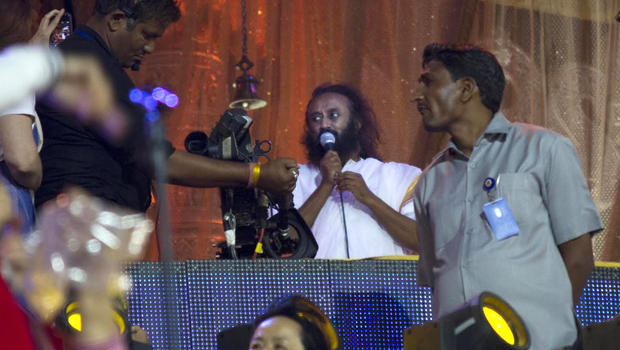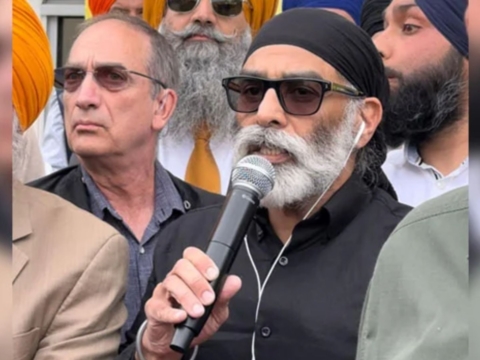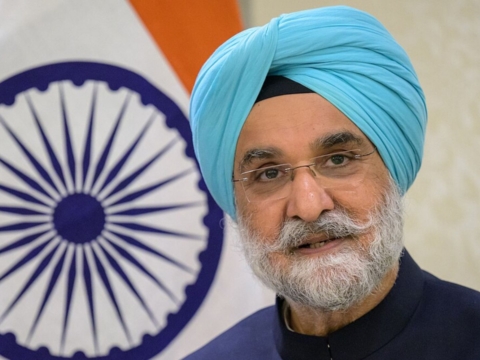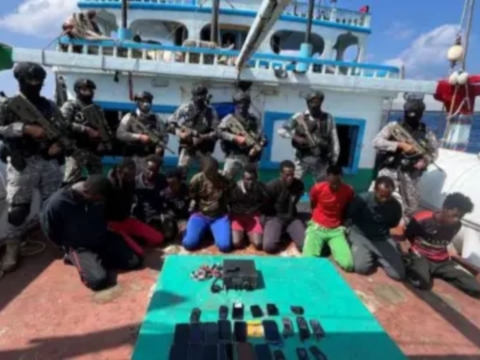
(Diya TV) — Over the weekend, thousands of people from 155 countries flocked to New Delhi for a vast cultural festival, which sought to promote the message of unity and peace — Sri Sri Ravi Shankar’s “Art of Living” foundation faced staunch opposition, and fines, from India’s National Green Tribunal because of the chosen venue: the banks of the polluted Yamuna River.
The tribunal fined Ravi Shankar 50m rupees for its construction of features that altered the topography and flow of a Delhi river before the festival.
Environmentalists accused the Hindu guru, and his organization, which runs centers around the world and in the U.S., of ignoring strict environmental policies with the construction of the festival’s huge stage and occupying an area which extended nearly 600 yards for the festival’s audience on the riverbank. Additionally, the activists say the festival will cause irreversible damage by compacting the soil and destroying the delicate ecosystem which is in place. Some of the area’s native bird populations have already disappeared as a direct result, the activists claim.
As a result, India’s National Green Tribunal was petitioned by the activists to stop the event, however, India’s environmental court gave the event the go-ahead just hours before the event was set to kickoff. But it ordered the Art of Living Foundation pay the fine, which amounts to more than $746,000 American, and chastized Indian government authorities for allowing such a massive event on the river’s bank.
The court also warned that no such event should be allowed on the river banks in the future.
Faiyaz Khudsar, who is in charge of the Yamuna Biodiversity Park, said the festival would carry “catastrophic” consequences for the wildlife along the river.
“The marshes and wetlands may have been silted or filled up resulting in the disturbance of the ecosystem. It will take some time to find out the exact damage. What it requires now is ecological intervention by humans, which takes a lot of time,” said Khudsar.
Manoj Mishra, who heads the Mission for Yamuna, the group which filed the petition with the court to block the event from happening along the river, said the event was a violation of measures put in place during 2015 aimed at improving the environment. He said a court-approved project, the Revitalization Project of 2017, was being “brazenly violated by clearing of vegetation, dumping of debris and earth, leveling of flood plain, destruction of biodiversity and construction activity.”

Ravi Shankar, who has an estimated 300 million followers in more than 150 countries worldwide, said he would rather go to jail than pay the fine. However, he ultimately changed his mind, agreeing to pay the amount as “compensation” for restoration work on the river.
Jha, the environmentalist, claims his black-flag protests outside the festival were stopped by police. He told CBS News, that allowing Ravi Shankar to pay the fine and continue with the festival could be compared to “someone who seeks to rape a woman and then compensate her.” He added: “Should we allow him to rape the woman? They are raping a river.”
Ravi Shankar has maintained that the festival could not and would not damage the river in any way. His organization contracted the services of environmentalists that insisted him of such, he said.
“We will make a proper plan and do something for the Yamuna. I have consulted top environmentalists, who have done a study and said that no harm will be done to the floodplains.”
Instead, Ravi Shankar suggested the festival will help the river.
“We have not built any permanent structures. We will ensure that the place is left cleaner and more beautified,” Art of Living spokesperson Dinesh Ghodke said. The event was estimated to attract an attendance of about 3.5 million, according to the foundation. However, due to heavy rain, the numbers were lower.
The festival was inaugurated by Prime Minister Narendra Modi and attended by top ministers in his cabinet. The guru has been observed publicly as a close friend of the prime minister, and in Indian Parliament, opposition parties questioned the reason behind the Modi government’s backing for the controversial event.
#WorldCultureFestival is a Kumbh Mela of culture…a great confluence of people from all over the world. Glad to be a part of the festival.
— Narendra Modi (@narendramodi) March 11, 2016





